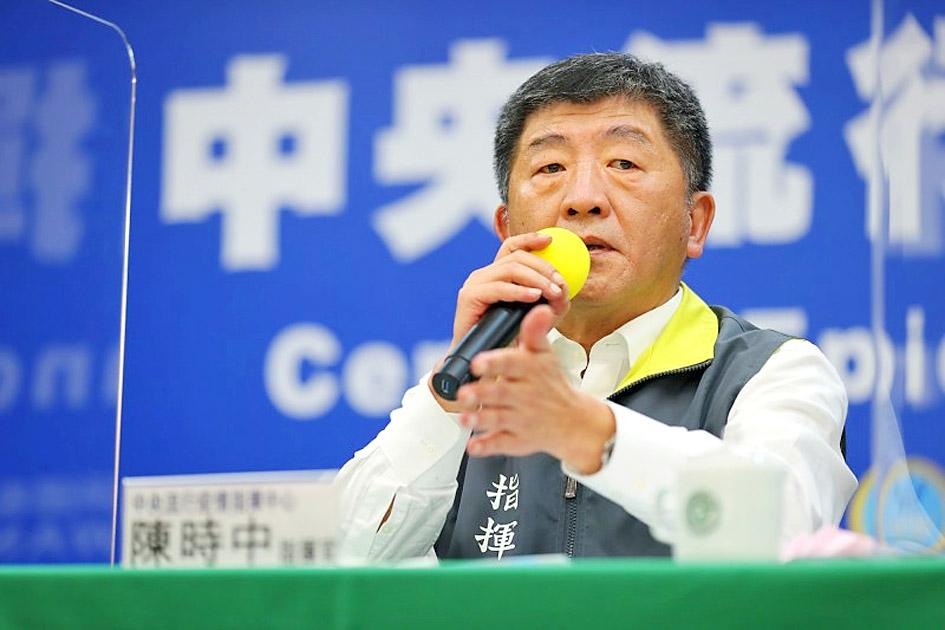Three Taiwanese tested positive for COVID-19 when they arrived in Japan earlier this month, the Central Epidemic Command Center (CECC) said yesterday as it reported a new imported case.
Minister of Health and Welfare Chen Shih-chung (陳時中), head of the center, said that one of the three cases in Japan is a Taiwanese baby under the age of one, whose parents work in Japan.
The infant came to Taiwan with his parents in January, and the parents paid for the family’s COVID-19 tests on Oct. 10 ahead of their planned return to Japan on Monday last week, he said.

Photo: Chung Li-hua, Taipei Times
The boy and his parents have not developed any symptoms of COVID-19, but the baby’s antigen test upon arrival was positive, while his parents’ were negative.
The second case is a Taiwanese woman in her 30s who went to Japan for work on Wednesday last week, after paying for a polymerase chain reaction (PCR) test on Monday last week, which was negative.
Her antigen test upon arrival was also positive, but another PCR test on Tuesday came back negative, Chen said.
The third case is another a one-year-old Taiwanese boy whose parents live permanently in Japan, Chen said.
The baby came to Taiwan with his mother in January, while his father returned in February.
The parents sought treatment for their son for a fever and respiratory symptoms on Sept. 28, and he appeared better on Oct. 5, however, an antigen test upon arrival in Japan on Wednesday last week came back positive, while his parents tested negative, Chen said.
A total of 155 close contacts of the two infants and the woman have been identified, and 147 were tested; 114 people received a negative PCR test result, while 33 tested negative in both a PCR test and an antibody test.
As of yesterday, a total of 49 travelers from Taiwan have been reported positive for COVID-19 in other countries, and 2,381 close contacts of the cases in Taiwan were identified, with 1,258 people required testing, Chen said.
Among those tested, 115 people tested negative in a PCR test, and 1,143 people tested negative in both the PCR and antibody tests, he added
Chang Shan-chwen (張上淳), convenor of the CECC specialist advisory panel, said that while several travelers from Taiwan (13 people) have been reported positive for COVID-19 in Japan, many tested negative in a PCR test about five to seven days afterwards.
He said the manual for the rapid antigen test kit used in Japan’s airports mentioned a clinical trial result, showing that among 30 people who tested positive with the antigen test, only 22 people tested positive in a PCR test, indicating that the sensitivity (true positive rate) of the kit is only about 73 percent.
Meanwhile, the new imported case is an Indonesian student in his teens, who came to Taiwan for study with five other Indonesians on Oct. 5.
The student had provided a negative PCR test result obtained three days before coming to Taiwan and was asymptomatic upon arrival, Chen said.
The student did not report suffering symptoms during quarantine, but he tested positive on Tuesday in a mandatory PCR test after the quarantine period ended, Chen said.
During contact investigation, the student reported that he had developed a cough and a sore throat on Oct. 8 while in quarantine, but they disappeared on Oct. 10.
The other five Indonesian have tested negative, and while two of them have been placed under home isolation, the other three will practice self-health management, the CECC said.

Trips for more than 100,000 international and domestic air travelers could be disrupted as China launches a military exercise around Taiwan today, Taiwan’s Civil Aviation Administration (CAA) said yesterday. The exercise could affect nearly 900 flights scheduled to enter the Taipei Flight Information Region (FIR) during the exercise window, it added. A notice issued by the Chinese Civil Aviation Administration showed there would be seven temporary zones around the Taiwan Strait which would be used for live-fire exercises, lasting from 8am to 6pm today. All aircraft are prohibited from entering during exercise, it says. Taipei FIR has 14 international air routes and

The Ministry of National Defense (MND) today released images of the military tracking China’s People's Liberation Army (PLA) movements during the latest round of Chinese drills around Taiwan. The PLA began "Justice Mission 2025" drills today, carrying out live-fire drills, simulated strikes on land and maritime targets, and exercises to blockade the nation's main ports. The exercises are to continue tomorrow, with the PLA announcing sea and air space restrictions for five zones around Taiwan for 10 hours starting from 8:30am. The ministry today released images showing a Chinese J-16 fighter jet tracked by a F-16V Block 20 jet and the

Snow fell on Yushan (Jade Mountain, 玉山) yesterday morning as a continental cold air mass sent temperatures below freezing on Taiwan’s tallest peak, the Central Weather Administration (CWA) said. Snowflakes were seen on Yushan’s north peak from 6:28am to 6:38am, but they did not fully cover the ground and no accumulation was recorded, the CWA said. As of 7:42am, the lowest temperature recorded across Taiwan was minus-5.5°C at Yushan’s Fengkou observatory and minus-4.7°C at the Yushan observatory, CWA data showed. On Hehuanshan (合歡山) in Nantou County, a low of 1.3°C was recorded at 6:39pm, when ice pellets fell at Songsyue Lodge (松雪樓), a

City buses in Taipei and New Taipei City, as well as the Taipei MRT, would on Saturday begin accepting QR code payments from five electronic payment providers, the Taipei Department of Transportation said yesterday. The new option would allow passengers to use the “transportation QR code” feature from EasyWallet, iPass Money, iCash Pay, Jkopay or PXPay Plus. Passengers should open their preferred electronic payment app, select the “transportation code” — not the regular payment code — unlock it, and scan the code at ticket readers or gates, General Planning Division Director-General Liu Kuo-chu (劉國著) said. People should move through the